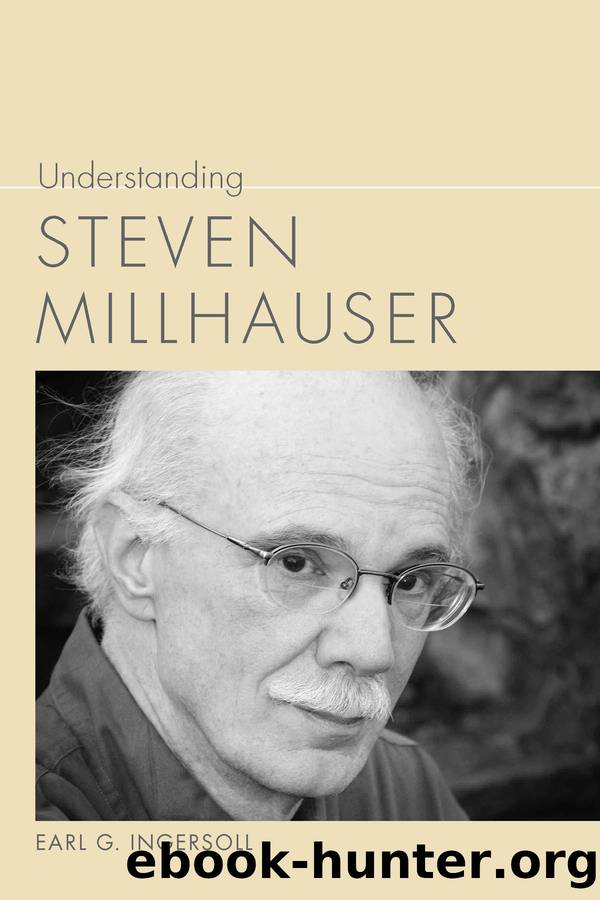Understanding Steven Millhauser by Ingersoll Earl G.;

Author:Ingersoll, Earl G.;
Language: eng
Format: epub
Publisher: University of South Carolina Press
Published: 2014-08-15T00:00:00+00:00
CHAPTER 8
Martin Dressler
Steven Millhauserâs Pulitzer Prizeâwinning novel, Martin Dressler (1996), will remind readers of his earlier novels such as Edwin Mullhouse and shorter fiction such as âAugust Eschenburgâ and âEisenheim the Illusionist.â Martin Dressler is a bildungsroman, following the development of yet another self-immersed dreamer/artist who lives for the pursuit of his own ideals and goals, with a minimal concern for financial success or relationships with others.
The ambivalence of the novelâs subtitleâThe Tale of an American Dreamerâaptly catches the storyâs double nature. It is a story of that quintessential American Dream, the concept of personal self-developmentâboth spiritual to the idealist and economic to the pragmatist. But it is also the âtaleâ of a âdreamer,â with its own ambivalenceâone who aspires and one who is no longer in touch with actuality. Martin at eight is a âdreamerâ of a larger world beyond the narrow confines of his fatherâs tobacco shop and the cramped living quarters above, especially his small room.
The setting over a century ago locates the narrative in a more innocent time in the United Statesâor so the myth proclaimsâto embody in Martin the âAmerican Dreamâ in its earlier and purer form. Dressler is no John D. Rockefeller, aspiring to immense wealth and power, but the representative of the Old Countryâs dream of a New World in which to dream oneself into a larger, more complex and more splendid state of being.1 Any success Martin achieves only whets his appetite for greater dreams of the ultimate âhotelâ as a world within the world. Because Dressler, like Eschenburg or Eisenheim, pushes himself to ever-greater achievements, this novelâs mode is essentially tragic. As Dressler himself senses, to rest upon his laurels as a visionary of the ultimate hotel is to accept a more ignominious defeat than to dream up worlds that are ever-more impractical for those he expects to move into these âcastles in the air.â To dream the impossible and not achieve it may be tragic, but such âfailureâ certifies the value of the dream, while being satisfied with actuality is to deny the grandeur of American dreaming of self-transformation.
As in his other renditions of personal development, Millhauser focuses on those aspects of Martinâs childhood that foreshadow the central issues of his adult life. The opening sentence draws readers into the story as a âtaleâ to be told, a fableââThere once lived a man . . . who rose from modest beginnings to a height of dreamlike good fortuneâ (Martin Dressler 1). The âAmerican Dreamâ of self-transformation as a nineteenth-century construct is underlined by its being a romantic dream of satisfying the âheartâs desireâ (2), rather than a tawdry effort to âget rich quick.â Even as a boy, Martin dreams of a life and a world that his parents could scarcely imagine.
Accordingly Martinâs parents, especially his father, represent crucial formative elements. Otto Dressler came to America seeking the Promised Land, but like Moses he gets no more than a Pisgah view because he is too timid, too beaten down by the Old Country to do more than beget a son who will dream the Dream.
Download
This site does not store any files on its server. We only index and link to content provided by other sites. Please contact the content providers to delete copyright contents if any and email us, we'll remove relevant links or contents immediately.
The Power of Myth by Joseph Campbell & Bill Moyers(925)
Half Moon Bay by Jonathan Kellerman & Jesse Kellerman(908)
A Social History of the Media by Peter Burke & Peter Burke(879)
Inseparable by Emma Donoghue(844)
The Nets of Modernism: Henry James, Virginia Woolf, James Joyce, and Sigmund Freud by Maud Ellmann(737)
The Spike by Mark Humphries;(719)
The Complete Correspondence 1928-1940 by Theodor W. Adorno & Walter Benjamin(703)
A Theory of Narrative Drawing by Simon Grennan(703)
Ideology by Eagleton Terry;(655)
Bodies from the Library 3 by Tony Medawar(647)
World Philology by(645)
Culture by Terry Eagleton(641)
Farnsworth's Classical English Rhetoric by Ward Farnsworth(640)
A Reader’s Companion to J. D. Salinger’s The Catcher in the Rye by Peter Beidler(609)
Adam Smith by Jonathan Conlin(605)
Game of Thrones and Philosophy by William Irwin(590)
High Albania by M. Edith Durham(587)
Comic Genius: Portraits of Funny People by(581)
Monkey King by Wu Cheng'en(575)
